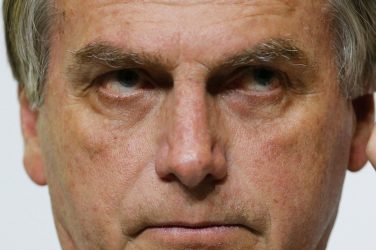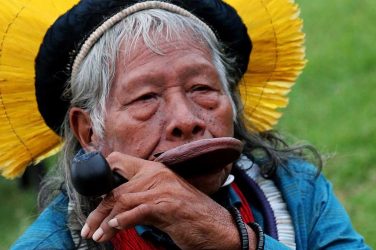Brazil, once the flagship of social democracy in Latin America, has become an international pariah. Since his inauguration as president on January 1st, 2019, Jair Bolsonaro has been implementing the programmed destruction of the 1988 constitution, which sanctioned the return to democracy after more than two decades of military dictatorship, at warp speed.
The retired army captain has never hidden his contempt for the rule of law. From the outset, it was obvious that he would try to move from far-Right populism to full-scale authoritarianism. No one could have imagined, however, that he would turn Brazil into a mass grave.
The Scourge of the Militias
Since February, Bolsonaro has had de facto control of both houses of Congress because lawmakers endorsed by him were chosen as speakers. By offering perks (half-a-billion euros for pork-barrel projects), ministries and government jobs, the president has the support of a bloc of lawmakers known as the Centrão or ‘grand center’. This cross-party group is known for its venality rather than for any ideological commitments.
Amid growing calls for Bolsonaro to be held accountable, he is trying to protect himself against impeachment for multiple alleged crimes. These include historical negation with his plans to celebrate the 1964 coup, ecological denialism by allowing the destruction of the Amazon, and his refusal to mitigate the spread of COVID-19.
Now, he wants to push forward with projects such as home schooling, the fight against pedophilia, and the persecution of so-called ‘gender ideologies’ in national education – all of which are popular with evangelical conservative voters.
He is also pursuing neoliberal economic reforms such as privatization, administrative reform and budgetary austerity, which appease banks and big business. Bolsonaro’s minister of finance, Paulo Guedes, is a so-called Chicago Boy, an advocate of the principles of Milton Friedman and the Chicago school of free-market economics.
Bolsonaro is also trying to loosen gun laws to reduce gun control and increase the number of guns the police, members of the armed forces and the judiciary could legally own for self-defense. This would directly benefit the military police, as well as army personnel involved in the federal government’s ongoing operations against drug traffickers, notably in Rio de Janeiro.
Countless civilians, mostly those who are Black and poor, have been killed in such operations – including many children. There has been a surge in paramilitary militias in the favelas (low-income settlements or slums) and popular neighborhoods of Brazil’s major cities.
The militias, made up of former soldiers, policemen and firemen, are a parallel force. Like a mafia, the militia engages in racketeering, compete for power with drug traffickers and infiltrate political networks.
Militias were once part of the death squads of Brazil’s dictatorship, which lasted until 1985. Now, they are said to have access to the highest echelons of power. By some accounts, they control nearly 60% of Rio de Janeiro.
But the president’s approval ratings have been seriously eroded by his mismanagement of the coronavirus crisis. In April, the Supreme Court ordered the Senate, the upper house of Parliament, to investigate the mishandling. Elsewhere, leading politicians and analysts have called for his removal and he has been accused of crimes against humanity in the International Criminal Court.
Bolsonaro’s room for maneuver is likely to be significantly restricted. The succession of crises, attacks on democracy, negligence towards his people’s health, and budgetary distortions have changed the way he is seen. The president has become toxic. It is becoming more likely with every day that he will not finish out his term in office.
In the long term, of course, Bolsonaro has only one goal: to abolish the constitution. In the medium term, he wants to win the 2022 presidential election at all costs. In the short term, he must avoid impeachment, primarily to protect his family.
If he loses power, his family would lose protection. But the reverse is also true. If his family loses their protection, the subsequent trials would likely trigger Bolsonaro’s impeachment, and he would fall. He has four sons and a daughter (the latter of whom he described as the result of a “weak shot”, with his usual macho vulgarity).
Three of his sons are active in far-Right political circles and have their own political careers. Although they are not members of the government, these three actively help their father to marshal support for his policies and to find likely candidates to fill important positions.
Flávio, who is called ’01’ by his father, is a senator. Accused of receiving kickbacks, he finds himself at the center of a scandal that is rumored to be linked to the militiamen who murdered prominent left-wing politician and activist Marielle Franco in 2018.
Carlos, known as ’02’, is a Rio de Janeiro city councilor. He is also a key member of the so-called ‘cabinet of hate’ that runs Bolsonaro’s armies of trolls. As for Eduardo, ’03’, he is a federal deputy. As the chair of the foreign affairs committee, he’s said to be the middleman who helps connect his father’s administration with other populist governments across the world.
Bolsonaro’s eldest three sons are under investigation for alleged corruption, while the fourth, businessman Jair Renan, is being investigated by Brazil’s federal police for alleged influence peddling. To protect them, the president is said to be systematically packing the public prosecutor’s office and tax departments, and pulling strings in the repressive federal police and the secret services.
He is also trying to control the armed forces. Although Bolsonaro was expelled from the army for indiscipline – he even planned a bomb attack while seeking a pay rise – the former captain has long cultivated links with the military.
Throughout his 30-year political career as an insignificant federal congressman, Bolsonaro managed to push through only two pieces of legislation – but he was always a tireless advocate of strong security policies.
More recently, following the establishment by former president Dilma Rousseff of a National Truth Commission, which reviews crimes committed by the military during the dictatorship, Bolsonaro has capitalized on the tensions between the armed forces and the political Left.
Under Bolsonaro’s presidency, the politicization of the military has morphed into the militarization of politics. In this respect, ‘Bolsonarism’ is reminiscent of Venezuela’s ‘Chavism’. The participation of high-ranking military personnel in the government (ten out of 21 ministers), in the administration (more than 6,000 civil servants) and in the public sector (one-third of the directors of state-owned companies), undermines democracy from within by compromising the armed forces.
General Hamilton Mourão, who serves as Bolsonaro’s vice-president, has put environmental policy under the control of the army and is deeply implicated in the alleged ‘ecocide’ of the Amazon. General Eduardo Pazuello, who was health minister until March 2021, has been criticized for lacking in public health expertise and downplaying the need for social distancing during the pandemic.
The army’s massive presence in the government means that the issue of a military coup has become unavoidable. Some say that perhaps it may already have taken place, without tanks or soldiers on the streets. When, at the end of March this year, the president indicated that he was planning to mobilize “his army” to prevent the lockdown imposed against his will in some states, the military brass distanced itself from Bolsonaro for the very first time.
The same defense minister who had last year supported demonstrations against democracy, said he refused to “transform a state institution into a government institution”. He was immediately sacked by the president, provoking a crisis in which the commanders of all three branches of the military tendered their resignation.
So, to carry out his coup, Bolsonaro can no longer rely on the armed forces. It is feared, however, that he may foment an insurrection by the police, in the name of protecting the economy. Unlike the army, the police are controlled by state governors.
If the police prove insufficient to his aims, Bolsonaro could also incite the militias and his army of trolls, possibly to mount an insurrection and take over Parliament, while also closing down the Supreme Court for good measure.
Now that the Supreme Court has suspended former president Luiz Inácio Lula da Silva’s conviction for corruption, he is seen as a formidable potential opponent in 2022. Bolsonaro had questioned the integrity of the 2020 US election long before the 6 January invasion of the US Capitol by supporters of former president Donald Trump. Were Bolsonaro to win in 2022, it’s possible that he would try to abrogate democracy; were he to lose, he would try the same.
In the face of such a serious threat to democracy, the impeachment of the president appears to be the only way out. With more than a hundred impeachment requests filed against Bolsonaro, there is no shortage of reasons to hold him accountable.
But those requests can move forward only if and when Arthur Lira, speaker of the lower house, decides to start impeachment proceedings. Lira, who was elected to his post with Bolsonaro’s support, himself has two open trials for alleged corruption, and has been accused of domestic violence by his wife.
He has leverage in negotiating with Bolsonaro, who once believed he could control Congress by allying himself with the ‘grand center’, but is now increasingly under its control. Notorious for their opportunism, the lawmakers who make up the ‘grand center’ will swap sides when their interests demand it.
‘Genocidal’ Management of the COVID-19 Crisis
Complicit in Brazil’s current predicament are the crooked politicians who blackmail the president; the military, which has for too long endorsed a government that openly threatens the institutional order; those who promote austerity in the middle of a pandemic; the evangelical pastors who say they are “ready to die” to keep the temples open; and the embattled 20% of the population that continues to support the president despite everything. But, there’s no doubt that sooner or later, Bolsonaro will be held accountable for the catastrophic mismanagement of the health crisis.
Meanwhile, his popularity is inversely proportional to the number of deaths from COVID-19. His most fanatical supporters – 15% of the population – offer him unconditional support, but his approval ratings are falling steadily and could well drop from 30% to 20%. Forsaken by the military, the press, the economic elite and a significant part of the population that voted for him, the president is increasingly isolated.
Unpredictable and irascible, he is becoming all the more dangerous, provoking one crisis after another. The recklessness and rash improvisation in the execution of public policies may have obscured the fact that the instigation of chaos is in fact the surest way to undermine the foundations of the republic and to concentrate, little by little, all the powers within his person.
The president does not really govern. Rather, to deconstruct the administrative state, he places his men (and three women) at the head of his government.
The ministers of environment, health, education, culture, foreign relations and human rights are intentionally corroding democratic institutions. While maintaining the facade of constitutional order, like termites they are eating away the institutions from within. The insistence that the institutions continue to function normally is hardly reassuring: the edifice can collapse at any moment.
Thus, when in a filmed meeting of his government Bolsonaro called for an armed insurrection of the citizens against the “dictatorship of lockdown”, there was general consternation but no impeachment. When a general, who can be described only as a putschist, openly threatened the Supreme Court with “unforeseeable consequences”, nobody asked him to resign. Bolsonaro appointed an attorney general whom he treats as his personal lawyer.
To eliminate his political enemies, the president asked local tribunals to investigate and indict governors for pocketing funds intended for the purchase of ventilators for hospitals. When the former minister of justice, Sérgio Moro, resigned, accusing the president of interference in the judicial process to protect his family, an investigation was opened, but no action was taken.
When a judicial enquiry revealed systematic embezzlement of public funds by Bolsonaro’s eldest son, the secret services were activated to investigate the tax authorities. When the operator of a kickback scheme, Fabrício Queiroz, an ex-militiaman who is said to be close to the Bolsonaro family, was found in the president’s long-time lawyer’s house, he was sent to prison but immediately released.
When a journalist asked Bolsonaro about the 89,000 Brazilian reais (US$ 17,000) that Queiroz allegedly put into Bolsonaro’s wife’s bank account, the president replied that he wanted to “smash his face in”.
The glorification of violence and the fascination with death are the hallmarks of Bolsonaro, who, it should be remembered, made the ‘pistol finger gesture (the index finger and thumb pointed like a gun) the rallying sign of his election campaign.
Never displaying even the slightest empathy with the victims of COVID-19, the president has politicized the pandemic. From the outset, he has downplayed the risks of COVID-19 – describing it as “a little flu”. In addition, he has systematically sabotaged social distancing, confinement and vaccination.
He has repeatedly stated that he will not be vaccinated. He is staunchly opposed to compulsory vaccination and proclaims that the vaccine can turn the citizen “into a crocodile”. In front of a crowd that, like him, does not wear a mask, he asserts “the best vaccine is the virus itself, without collateral effects”.
Former health minister Pazuello recommended chloroquine as “early treatment” for the disease, wilfully ignoring the dangerousness of promoting crackpot theories. Had Pazuello, the third of Bolsonaro’s four health ministers since the start of the pandemic, put as much energy into ordering vaccines, oxygen and anaesthetics as the army has put into producing chloroquine or manipulating official statistics, Brazil would not now be reaching 2,000-3,000 deaths a day.
Brazil’s Authoritarian President?
A scientific analysis of more than 3,000 regulations and decrees related to the pandemic last year, concluded that there was an institutional strategy to spread the virus. The report, by the Center for Research in Public Health Law at the University of Sao Paulo and Conectas Direitos Humanos, accused the Brazilian government of purposely allowing COVID to spread throughout the country.
The combination of a failed vaccination campaign and uncontrolled contagion is turning Brazil into a breeding ground for SARS-Cov-2 variants. Researchers warned that this in vivo experiment is fast becoming a threat to the rest of the world.
With four variants spreading during the second wave, the country’s health system is on the verge of collapse. The situation in Manaus, the capital of Amazonas, Brazil’s largest state, in January, seemed like a warning. Hospitals had run out of beds and oxygen tanks. The system had gone into meltdown.
In fact, several cities in Brazil no longer have any beds available in intensive care wards. Doctors are being forced to triage patients and decide on the spot who will go to intensive care and who will go to the morgue. There is a shortage of oxygen. In the absence of sedatives, patients are forcibly strapped to their beds to be intubated. COVID victims are getting younger and younger. Half are now under 40. Without comorbidity, they are staying longer in the intensive care units too.
Coffins are becoming scarce. Cemeteries are overcrowded. Without a lockdown, Brazil will quickly reach the mark of half a million deaths. With less than 3% of the world’s population, Brazil already accounts for 10% of all COVID-19 victims. In recent weeks, just before India became the epicenter of the pandemic, that figure was at 30%.
A statistical comparison with other countries in the world has established that the probability of dying from COVID-19 is three to four times higher in Brazil than anywhere else. A correspondent for the prestigious medical journal The Lancet says that 75% of the then 400,000 deaths recorded can be attributed to Bolsonaro.
The International Criminal Court in The Hague will have to take this into account when considering charges of genocide and crimes against humanity.
Frédéric Vandenberghe is professor of sociology, at the State University of Rio de Janeiro.
Jaime Marques Pereira is Emeritus Professor of Economics at the University of Picardy Julio Verne/CRIISEA
This article appeared originally in Open Democracy – https://www.opendemocracy.net/





